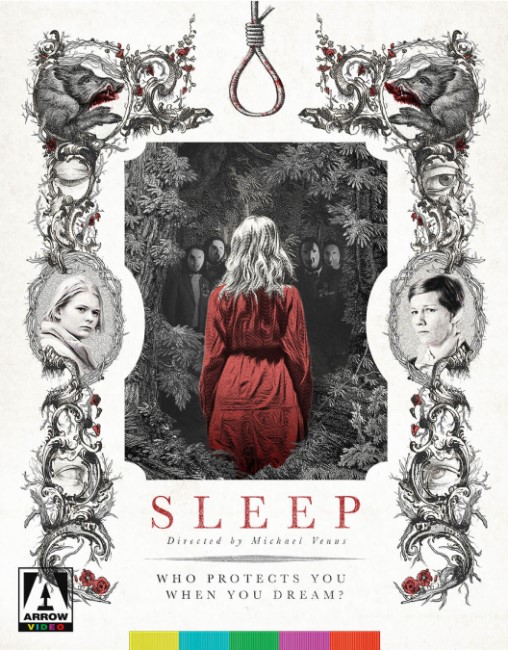Mona (Gro Swantje Kohlhof) takes care of her mother Marlene (Sandra Hüller), who has a rare sleeping condition. It causes Marlene to not know whether she’s awake or dreaming, and she wakes up in the middle of the night struggling to breathe. The nightmares always take place at the same hotel and feature three men committing suicide. When Marlene discovers that she’s dreaming of a real place, she travels to the nearly deserted hotel sits to solve the mystery of her nightmares and to keep herself from going insane. Within minutes of arriving, she collapses and is hospitalized after experiencing something so terrifying that it leaves her in a vegetative state. Mona arrives to take care of her mother and to try and figure out what happened. Suddenly, Mona begins suffering the same symptoms of the illness that has plagued her mother for years.
I caught the trailer for Sleep (2020) a while back and thought that I knew what kind of a film I would eventually be getting myself into once I finally got my hands on it. And here I am happily reporting that it was so much different than I expected that I was just dumfounded after it was over. I can’t recommend this film highly enough. The cast each gives their performances a blend of realism, pathos, humor, and outright strangeness that hits the mark so well here. The music score by Sebastian Damerius and Johannes Lehniger has moments of cave-like reverbs echoing and bouncing off of unknown horrors and unimaginably cool instrumentation that can get very unsettling at any moment.
Sleep is enigmatic, funny, smart, and subversive. It never does anything easy and unfolds in bizarre ways to keep you off your guard from start to finish. Director Michael Venus and writer Thomas Friedrich handle the scenes where dreams and reality blend without gimmicks and make not knowing the difference between the two worlds frightening in unexpected ways. One odd thing about this film -which might just be me nerding out all up in here- is a vaguely Japanese horror vibe I got from it. I wonder if the dream logic and tone of Kiyoshi Kurosawa’s Retribution (2006) or Shin’ya Tsukamoto’s Nightmare Detective (also 2006) had any influence on Venus and Friedrich when they were writing Sleep. Probably not but hey, I’m confident enough to jot this down in my dream journal tomorrow morning. That’s a promise.
If Arrow Video is trying to win some kind of a world record for most extras on a disc, then Sleep might be their ticket to winning it and holding the title forever. This disc should weigh about 200 pounds with all the stuff packed into it. I’m surprised there was room for the film! Man, that’s funny stuff I wrote right there. The audio commentary by Kim Newman and Sean Hogan is laid back and feels like two friends discussing a film that just dazzled them. There are two great visual essays on this disc. The first, by film scholar Alexandra Heller-Nicholas, is an excellent look at the possible fairy tale origins of the film. The second is by film critic Anton Bitel, who dives deep into the plot and imagery of Sleep to get into the film’s take on the dark parts of Germany’s past.
There’s also an interview with anthropologist, dream researcher, and filmmaker Louise S. Milne about the film and a short behind-the-scenes featurette. Due to the pandemic, Sleep’s director, Michael Venus, and star, Gro Swantje Kohlhof, couldn’t make the in-person screenings so they made some hilarious introductions for the film. In one Venus paddles a great distance to get to a cancelled film festival while his star pretends to be boarding a plane to fly there (even though she’s just getting ready for bed). The disc also features deleted scenes and a video about the creation of Marlene’s disturbing dream journals and sketchbooks in the film.

